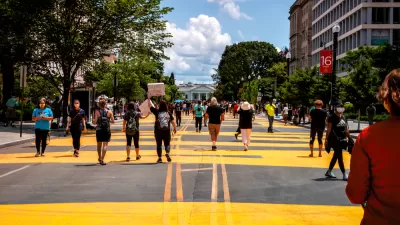When President-elect Barack Obama is inaugurated on January 20, the city of Washington D.C. is likely to be the most lively, exciting and vibrant city in the world. Millions will be there. Hotels for miles around are booked full, couches across the city will be crashed upon, and many in the city are expecting the party to last for days. City officials are doing what they can to make sure the party does indeed happen.
When President-elect Barack Obama is inaugurated on January 20, the city of Washington D.C. is likely to be the most lively, exciting and vibrant city in the world. Millions will be there. Hotels for miles around are booked full, couches across the city will be crashed upon, and many in the city are expecting the party to last for days. City officials are doing what they can to make sure the party does indeed happen.
For the four days leading up to inauguration day, bars in Washington D.C. will be allowed to stay open 24 hours a day, and be able to sell alcohol until 5 a.m., two to three hours past the usual last call. The mere idea of adding a couple extra hours into the city's bar scene is sure to inspire the prospect of late-night celebrating in D.C., This is a prime example of what I like to call event-based urbanism -- a topic I'll be looking at much more in the near future.
The city council approved the hour extension 9 votes to 4, a move that's likely to boost sales at local bars, add thousands of additional drunken cab rides to the early morning, and give the local police a little more booze-related idiocy to deal with. Pros and cons abound, but what's certain is that three more hours of alcohol sales will mean three more hours of overpriced booze-buying, three more hours of drunken impulse purchases, and three more hours of pay for services workers like police, cab drivers and restaurant workers. The D.C. economy stands to be the big winner here.
It's also an obvious win for America's favorite drug addiction. Some in the city have criticized officials for encouraging the inevitable delinquent behavior that's bound to result from four nights of extended boozing. Despite the obvious detractions, the benefits of embracing this historic event by stimulating civic engagement and public celebration was more what city councilors had in mind when they enacted this "emergency legislation".
Emergency legislation. Kind of reminds you of that other "emergency legislation" they've been talking about on Wall Street lately. But while the impact of bailing out the country's financial underbelly with billions of American dollars probably won't be visible for months, if ever, Washington D.C.'s alco-law is sure to provide an immediate boon for the local economy. It'll work because people like to drink in general, and they like to drink even more when there's a reason to celebrate. Allowing them to celebrate longer during what will likely be America's biggest party will be a great way to not only inject a sense of civic engagement into the citizenry but also to inject a flood of tax-revenue generating money directly into local businesses, and by extension, the city budget. With ideas like this, the city is battling the recession to save itself from the bottom up. That's a bailout worth drinking to.

Montreal Mall to Become 6,000 Housing Units
Place Versailles will be transformed into a mixed-use complex over the next 25 years.

Planetizen Federal Action Tracker
A weekly monitor of how Trump’s orders and actions are impacting planners and planning in America.

DARTSpace Platform Streamlines Dallas TOD Application Process
The Dallas transit agency hopes a shorter permitting timeline will boost transit-oriented development around rail stations.

Without International Immigrants, the Rural US Population Would Be Falling 58%
Census data shows that population growth in rural areas is due in large part to international migrants.

Dead End: Nine Highways Ready for Retirement
The Freeways Without Futures report describes the nation’s most promising highway removal proposals.

Congressman Proposes Bill to Rename DC Metro “Trump Train”
The Make Autorail Great Again Act would withhold federal funding to the system until the Washington Metropolitan Area Transit Authority (WMATA), rebrands as the Washington Metropolitan Authority for Greater Access (WMAGA).
Urban Design for Planners 1: Software Tools
This six-course series explores essential urban design concepts using open source software and equips planners with the tools they need to participate fully in the urban design process.
Planning for Universal Design
Learn the tools for implementing Universal Design in planning regulations.
City of Mt Shasta
City of Camden Redevelopment Agency
City of Astoria
Transportation Research & Education Center (TREC) at Portland State University
City of Camden Redevelopment Agency
Municipality of Princeton (NJ)
Regional Transportation Commission of Southern Nevada



























